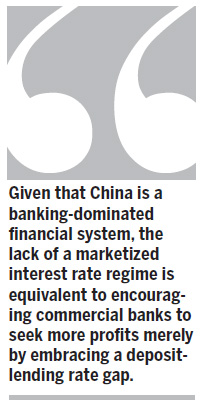Web Comments
Speed up interest rate reform
Updated: 2010-12-24 07:52
By Guo Tianyong (China Daily)

Despite slow progress in the past, market-oriented steps are expected in banking in the next five years
China should take more action to promote steady and unwavering marketization of the current rigid interest rate regime, a practice that is widely adopted in developed economies such as the United States and Japan.
Due to the influence of a complicated series of political and economic factors, no substantial progress has been achieved in this aspect during the period of the 11th Five-Year Plan (2006-2010). However, messages transmitted from a recent top Communist Party of China (CPC) conference indicate that the pace of rate marketization is expected to accelerate in the coming years.
At the CPC Central Committee conference, held in October aimed at mapping out guidelines for the 12th Five-Year Plan (2011-2015) for national economic and social development, the authorities vowed to steadily push forward marketized reforms of the country's interest rates.
The practice of setting the ceiling and bottom interest rates for deposits and loans - to prevent any possible vicious competition among commercial banks for market share - has often meant the country's interest rate level has failed to reflect the real conditions of funds supply and demand. It also serves as the main reason why the country's monetary tools have sometimes failed to produce the expected policy results. More importantly, the ceiling interest rate for deposits has directly resulted in a negative interest rate for big depositors in the context of the ever-rising inflation rate.
In the absence of other viable investment channels, a negative interest rate will inevitably cause a large volume of idle funds to swarm into the stock and real estate markets, aggravating bubbles in these two speculation-prone sectors. As the result of such a negative deposit interest rate, excess liquidity will also choose to withdraw from the banking system to the capital and commodity markets, adding to inflation pressures.
Given that China is a banking-dominated financial system, the lack of a marketized interest rate regime is equivalent to encouraging commercial banks to seek more profits merely by embracing a deposit-lending rate gap. This will undercut these banks' motivation to improve their ability to ward off financial risks and sharpen their competitiveness.
Market-oriented reforms of the interest rate regime will mark an important step toward optimizing the country's economic structure and defusing potential economic problems. The central bank should push forward such reforms in a steady but also more active way.
Despite the uniform interest rates adopted by domestic commercial banks for depositors, marketization of the rates will remain an irreversible trend in a globalized context. The suspension of the current administratively regulated ceiling and bottom limits on depositing and lending and allowing them to fluctuate in the market within a certain range will not cause chaos. The policy does not aim to curb the overheating of the national economy but aim to maintain a stable fluidity within the banking sector. In addition, moderate rate fluctuations made by commercial banks under a flexible interest rate regime are not expected to have much impact on the whole national economy.
Considering the importance of maintaining financial stability in a post-crisis era, China should push forward marketization of interest rates in a gradual and orderly manner. As the first step, the country should choose a certain region for experimentation and then spread the practice to the rest.
Once the current ceiling and bottom rates are suspended, the country's central bank should set an objective and market-sensitive benchmark rate. Currently, the deposit and lending rates the central bank sets for specialized banks and other financial bodies are taken as benchmark rates. As marketization of the rates advances, the SHIBOR, or the Shanghai Interbank Offered Rate, should be gradually cultivated into the benchmark rates in a bid to push domestic financial bodies to perfect their pricing mechanism. In an era of marketized interest rates, the benchmark rates should play a big role in transmitting messages to the market about the country's financial and monetary policies.
As a relatively independent sector, the country's banking industry should enjoy larger pricing power. Market-oriented interest rate reforms should be carried out to facilitate national economic development or the banking sector's self-improvement. To this end, a variety of auxiliary measures, such as a necessary deposit insurance system and a more effective financial oversight mechanism should be put in place.
At the same time, the banking sector should also accelerate its transformation, such as expanding its business with small- and medium-sized enterprises and boosting its retail business, to set up a more reasonable assets and income structure and offset the impact brought by marketization of the country's interest rate regime.
Given the sluggish progress made over the past years, the country should take more efficient measures to marketize its interest rates in a bid to achieve an essential breakthrough in the years to come. The internationalization of the yuan and the marketization of its exchange rate and derivative tools also require essential steps be taken toward this target.
The author is head of the China Banking Research Center at the Central University of Finance and Economics.
(China Daily 12/24/2010 page8)
E-paper

Ear We Go
China and the world set to embrace the merciful, peaceful year of rabbit
Preview of the coming issue
Carrefour finds the going tough in China
Maid to Order
Specials

Mysteries written in blood
Historical records and Caucasian features of locals suggest link with Roman Empire.

Winning Charm
Coastal Yantai banks on little things that matter to grow

New rules to hit property market
The State Council launched a new round of measures to rein in property prices.
